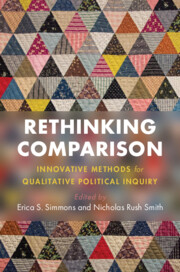Book contents
- Frontmatter
- Dedication
- Contents
- List of Figures
- List of Tables
- List of Contributors
- Acknowledgments
- 1 Rethinking Comparison: An Introduction
- Part I Rethinking the Building Blocks of Comparison
- Part II Developing New Approaches to Comparison through Research
- Theory and Imagination in Comparative Politics: An Interview with Lisa Wedeen
- Index
Theory and Imagination in Comparative Politics: An Interview with Lisa Wedeen
Published online by Cambridge University Press: 24 September 2021
- Frontmatter
- Dedication
- Contents
- List of Figures
- List of Tables
- List of Contributors
- Acknowledgments
- 1 Rethinking Comparison: An Introduction
- Part I Rethinking the Building Blocks of Comparison
- Part II Developing New Approaches to Comparison through Research
- Theory and Imagination in Comparative Politics: An Interview with Lisa Wedeen
- Index
Summary
In an interview with Lisa Wedeen, one of the contemporary comparative political scientists whose work most consistently speaks to both political science and interdisciplinary audiences, the editors ask Wedeen to reflect on the role that comparison has played in her work. Wedeen is the author of three groundbreaking monographs on seemingly single cases – two on Syria and one on Yemen. Yet, in the course of the interview, it becomes apparent how profoundly comparative Wedeen’s work is. She discusses her comparison of “exemplary events” in her field sites as a method through which to draw broad lessons about politics from apparent ephemera. She discusses the comparisons she makes between ethnographic insights and political theory to tack back and forth between empirical and theoretical material with the goal of developing new ways to think about politics. And she discusses the ways in which these comparative practices make her work not just an empirical practice but also a political practice – one that makes the work of a comparative political scientist not just a career but a vocation.
Keywords
Information
- Type
- Chapter
- Information
- Rethinking ComparisonInnovative Methods for Qualitative Political Inquiry, pp. 251 - 274Publisher: Cambridge University PressPrint publication year: 2021
